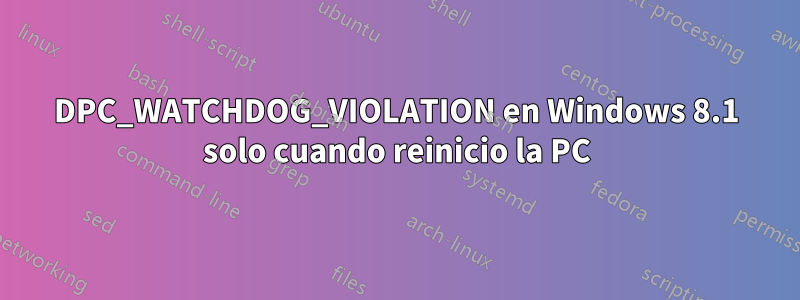
Recibo el temido DPC_WATCHDOG_VIOLATION en un equipo Windows 8.1 recién configurado. Utiliza una placa base Gigabyte H87-HD3, i5 4570, 16 GB de RAM y un SSD Kingston de 240 GB (no hay otro hardware en el M/b). Logitech Wireless Keyboard K520 + ratón mediante receptor USB unificado. El SSD está configurado como SATA, AHCI está ENCENDIDO. UEFI está configurado en 'UEFI y Legacy'. No utilicé los controladores Intel mientras configuraba el SSD, dejé que Windows particionara/formateara la unidad.
Por lo demás, el sistema es estable, pero en casi todos los 'Reinicios' se congela justo después de que aparece la pantalla de inicio. La mayoría de las veces falla antes de ingresar la contraseña, ocasionalmente llega al ingreso de la contraseña pero se congela y falla con DPC_WATCHDOG_VIOLATION poco después. Si apago y enciendo, no hay problemas.
A menudo he visto que la conexión de red muestra una exclamación amarilla antes de fallar. Intenté actualizar los controladores de red pero fue inútil. (Estoy usando LAN integrada sin adaptador WIFI en el sistema).
He subido los archivos Minidumpaquí. Cualquier ayuda con el análisis de fallos es muy apreciada.
Respuesta1
Parece que tienes un problema con el controlador de audio:
*******************************************************************************
* *
* Bugcheck Analysis *
* *
*******************************************************************************
DPC_WATCHDOG_VIOLATION (133)
The DPC watchdog detected a prolonged run time at an IRQL of DISPATCH_LEVEL
or above.
Arguments:
Arg1: 0000000000000001, The system cumulatively spent an extended period of time at
DISPATCH_LEVEL or above. The offending component can usually be
identified with a stack trace.
Arg2: 0000000000001e00, The watchdog period.
Arg3: 0000000000000000
Arg4: 0000000000000000
Debugging Details:
------------------
DPC_TIMEOUT_TYPE: DPC_QUEUE_EXECUTION_TIMEOUT_EXCEEDED
CUSTOMER_CRASH_COUNT: 1
DEFAULT_BUCKET_ID: WIN8_DRIVER_FAULT
BUGCHECK_STR: 0x133
PROCESS_NAME: svchost.exe
CURRENT_IRQL: d
STACK_TEXT:
00 nt!KeBugCheckEx
01 nt! ?? ::FNODOBFM::`string'
02 nt!KiUpdateRunTime
03 nt!KiUpdateTime
04 nt!KeClockInterruptNotify
05 hal!HalpTimerClockInterrupt
06 nt!KiCallInterruptServiceRoutine
07 nt!KiInterruptSubDispatchNoLockNoEtw
08 nt!KiInterruptDispatchLBControl
09 HDAudBus!HdaController::Isr
0a nt!KiCallInterruptServiceRoutine
0b nt!KiScanInterruptObjectList
0c nt!KiChainedDispatch
0d HDAudBus! ?? ::FNODOBFM::`string'
0e nt!KiExecuteAllDpcs
0f nt!KiRetireDpcList
10 nt!KxRetireDpcList
11 nt!KiDispatchInterruptContinue
STACK_COMMAND: kb
FOLLOWUP_IP:
HDAudBus!HdaController::Isr+13e
fffff800`026fe1cd 488b4628 mov rax,qword ptr [rsi+28h]
FAILURE_BUCKET_ID: 0x133_ISR_HDAudBus!HdaController::Isr
BUCKET_ID: 0x133_ISR_HDAudBus!HdaController::Isr
ANALYSIS_SOURCE: KM
FAILURE_ID_HASH_STRING: km:0x133_isr_hdaudbus!hdacontroller::isr
Entonces actualice el controlador de audio realtek:
Image path: \SystemRoot\system32\drivers\RTKVHD64.sys
Image name: RTKVHD64.sys
Timestamp: Tue Oct 29 11:18:58 2013
Respuesta2
Este problema finalmente se resolvió actualizando el BIOS y los controladores a través de la herramienta App Center de Gigabyte. Primero actualicé los controladores, luego actualicé el BIOS (de la versión F5 a F6), reinicié y el BSOD se detuvo. No he recibido uno en las últimas 3 semanas, ¡así que digo que estamos listos!


